The Honda Accord has been an iconic car on roads in the United States since the day it hit the market. But there has been a mixture of hits and misses across the history of the Honda Accord. So, what are the Honda Accord Years to Avoid?
Certain model years of the Honda Accord have lower reliability scores or common issues according to some owners. Reported problems include transmission issues in the 2003 model, power steering system problems in 2008, excessive oil consumption in 2013, and infotainment system glitches in 2018.
When shopping for a vehicle, it’s always wise to look into the problems that a particular line has experienced over the years. Doing so can provide you with useful insights on what is and is not a sensible purchase.
Fact is, the Honda Accord has been one of the most beloved cars built in the U.S. for many years now. And I think it’s safe to say, its appeal has stood the test of time.
But as is to be expected, with such a large list of annual models throughout history, not every year and model have seen unanimous success in its debut to the public.
Whether there were some quantifiable drawbacks or unspoken exterior opinions, some years didn’t make quite as big an impression as others.
Truth is, there are a few concerning issues with each of these models. And we’ll touch on each one of them to see why they are considered the worst years for the Honda Accord. Let’s dive into this!
Why Avoid the 1999, 2000, 2001 Honda Accord?
The late 90’s and early 2000 model years of the Honda Accord’s production have not fared well for vehicle reliability. These model years faced repeated issues with the electrical system, failing transmissions, hard or jerky shifting, and EGR valve failure.
Users also report problems with bad motor mounts, leading to engine vibrations that are very costly to fix. Naturally, these issues pose a safety hazard to the driver. This is why savvy buyers avoid these latter years of the 6th gen.
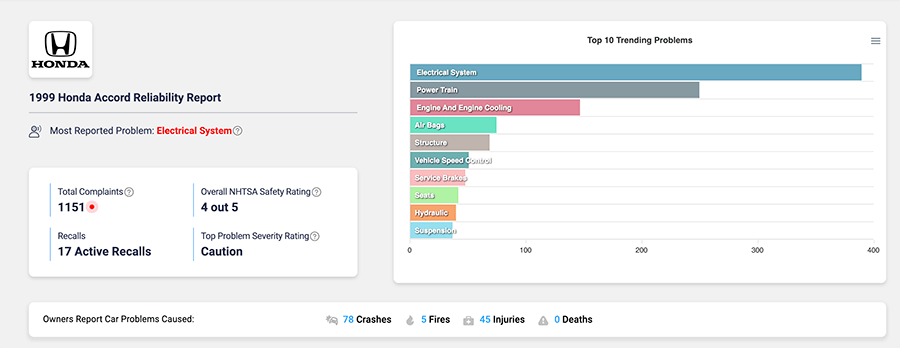
View the 1999 Honda Accord Reliability Report
Safety Concerns
Most importantly, these early model Accords suffered from defective airbags. However, Honda did eventually issue a recall for the front driver side airbag.
If you are considering this model year Honda Accord, be sure to check that the following NHTSA recalls have been performed for the airbag problem: 19V182000, 19V499000, and 15V320000.
Why Avoid the 2003-2007 Honda Accord?
Airbag and transmission problems persist in the 7th gen 2003-2007 models. In fact, they were the subject of a recall because the inflators would not work as intended. In some cases, the airbag sensors were faulty as well, causing them not to activate properly.
Transmission issues continued to plague the Accord for the 2003-2007 models. From faulty torque converters, to sudden loss of power.
If you’re interested in a 2003-2007 gen, then you definitely need to check whether the airbags and transmission has been serviced. If not, it’s better to avoid this model altogether or commit to having them replaced quickly.
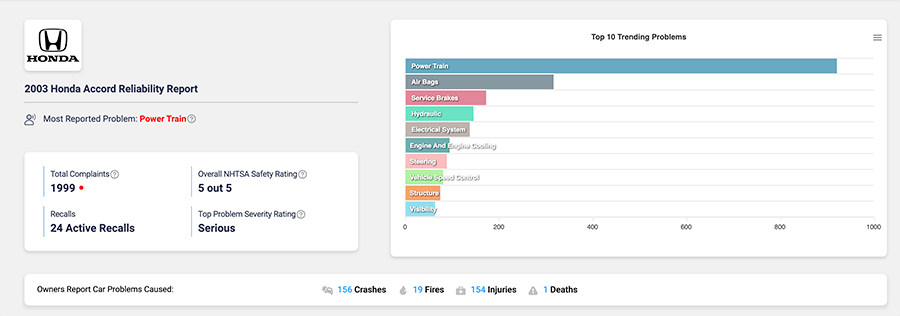
View the 2003 Honda Accord Reliability Report
Safety Concerns
Honda did eventually issue a recall for both the front driver and passenger side airbag. If you are considering this generation Honda Accord, be sure to check that the following NHTSA recalls have been performed for the airbag problems: 14V353000, 15V370000, 14V700000, 15V320000, 17V220000, 18V268000, 19V501000, 19V499000, and 19V182000.
Why Avoid the 2008 Honda Accord Model?
The 2008 Accord is considered to be the most problematic Honda Accord and should be avoided in most cases.
Poor brake performance is the number one complaint by many, and could lead to an accident. Oil leaks are also a headache for this model year.
Then throw in the fact that the 2008 has continued airbag faults that necessitate constant servicing. Be wary if you see a great deal on any 2008 Accord; it’s probably not worth it.
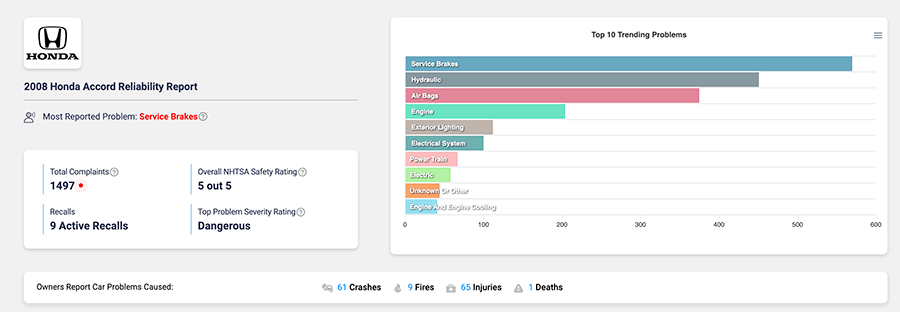
View the 2008 Honda Accord Reliability Report
Safety Concerns
If you are considering this generation Honda Accord, be sure to check that the following NHTSA recalls have been performed: 16V346000, 16V056000, 17V030000, 17V545000, 19V378000, 19V502000, and 18V268000.
Why Avoid the 9th Generation 2013-2017 Honda Accord?
The 9th Gen 2013-2015 Accords have a less reliable engine, particularly concerning the fuel pump, fuel lines. This generation also had steering system problems.
These issues may seem smaller in comparison, but fuel system problems can be extremely difficult to diagnose and fix, making this a deceptively expensive vehicle to maintain.
The primary concern lies in the reliability of the 2013 Accord, specifically due to reported steering problems that leave owners experiencing a sensation of locked steering. Alarming enough, this issue has led to several unfortunate accidents.
Owners have noted a decrease in issues with the 9th generation Accord starting from the 2017 model year. However, it is important to mention that steering and electrical problems have persisted. Although not as widespread as previous model years.
If you are determined to purchase a 9th generation Accord, it is advisable to avoid the 2013 model year.
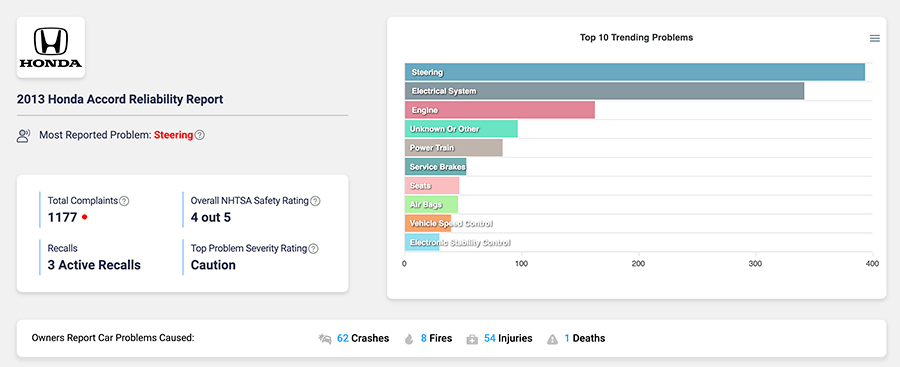
Safety Concerns
This generation Honda Accord had it’s share of recalls. Be sure to check that the following NHTSA recalls have been performed for various problems for driveshaft, fuel and airbag defects: 17V418000, 13V297000, 20V769000, 15V121000, 19V060000.
10th Generation 2018-2022
Some owners have reported problems with the infotainment system, including screen freezes and connectivity issues, in certain 2018 Accord units. Minor inconveniences, that can easily be addressed with a software update.
However, 2018 model saw the emerging problem with the Forward Collision Avoidance system. In fact, this problem trend has continued all the way up to the 2022 Honda Accord model year.
Owners have reported the Forward Collision Avoidance system causes sudden, random moments of the vehicle breaking on its own. In fact, owners report the car will randomly apply the brakes with nothing in front of it, giving a beeping noises and flash “brake” on the dashboard.
Concerns regarding the Forward Collision Avoidance system have become a recurrent complaint among owners of late-model Honda vehicles. If you are contemplating the purchase of a 2018-2022 Honda Accord, it is important to conduct thorough research into this potentially hazardous issue.
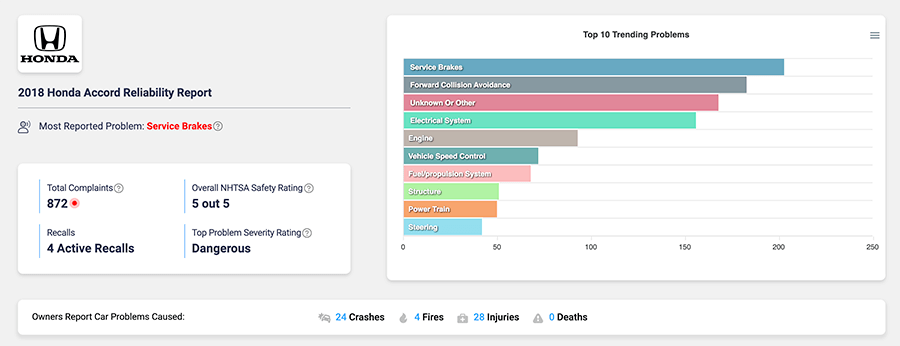
Safety Concerns
Naturally, due to the relatively shorter time these 2018-2022 Accords have been on the road, recalls have been infrequent. However, if considering a 10th generation Accord, be sure to check that the following NHTSA recalls have been performed for fuel system problems and various software updates: 20V314000, 20V771000, 21V215000, 18V629000, 23V158000, 21V900000, and 23V430000.
Honda Accord Years to Avoid FAQs
What safety features does the Honda Accord offer?
The Accord typically comes with a suite of safety features, including Honda Sensing® technologies, adaptive cruise control, lane-keeping assist, and collision mitigation braking system.
How much cargo space does the Honda Accord have?
The cargo space is generally around 16.7 cubic feet.
What is the warranty coverage for the Honda Accord?
Honda typically offers a limited warranty that covers the Accord for 3 years or 36,000 miles and a powertrain warranty for 5 years or 60,000 miles.
Can I tow with the Honda Accord?
The Honda Accord is not designed for towing, and doing so may stress the transmission.
Does the Honda Accord have all-wheel drive system?
No, the Honda Accord is equipped with standard front-wheel drive (FWD), while currently, there are no Honda AWD vehicles available in the Accord lineup.
How many people can the Honda Accord seat?
The Honda Accord usually seats up to five passengers.
Does the Honda Accord have a hybrid version?
Yes, the Honda Accord offers a hybrid version that is capable of 51 mpg city, and 44 mpg highway.
How often should I service my Honda Accord?
Honda recommends regular maintenance and service intervals every 5,000 to 7,500 miles or based on the maintenance minder system.
What type of transmission does the Honda Accord have?
The Honda Accord usually comes with a Continuously Variable Transmission (CVT) or a 10-speed automatic transmission, depending on the trim and engine.
Does the Honda Accord have a spare tire?
Yes, however in the most recent model years, some Honda Accord models have replaced the traditional spare tire with a tire repair kit.
Is the Honda Accord a reliable car?
Generally, the Honda Accord is considered a reliable and well-built vehicle with a history of good performance and durability. However, some years have been proven more reliable than others.
What is the maximum speed of the Honda Accord?
The top speed of the Honda Accord is electronically limited and typically ranges between 116 to 155 mph, depending on the model and engine.
How does the Honda Accord perform in crash tests?
Overall, the Honda Accord has historically performed well in crash tests conducted by organizations like the National Highway Traffic Safety Administration (NHTSA) and the Insurance Institute for Highway Safety (IIHS). In fact, the NHTSA has given the Honda Accord a 5 out of 5 for overall safety.
Does the Honda Accord require premium gasoline?
The majority of Honda Accord models are designed to run on regular unleaded gasoline. But check the owner’s manual for the recommended fuel type.
Can I connect my phone via Bluetooth in the Honda Accord?
Yes, the Honda Accord typically comes equipped with Bluetooth connectivity.
Final Thoughts: Honda Accord Years to Avoid
Knowing what model years are considered more ‘troubled’ can help you narrow down your choice and make an informed decision. We discussed some of the common reported problems for 2003, 2008, 2013, and 2018’s models of the Honda Accord.
At the end of the day, there’s no denying that the Honda Accord has been a successful staple in American culture since its introduction. It’s earned its reputation as a reliable model over time, and buyers should not be turned away from selecting one.
With its record backing it up and enough research on your end to understand any potential risks inherit in certain models, purchasing one could be a smart financial move worth making.
To be sure to find the safest and most reliable Honda Accord, get a MyCarVoice vehicle reliability report. Running a quick reliability preview is free, but for only $2.99 unlocks the full report. A small cost to help find a smart vehicle purchase!
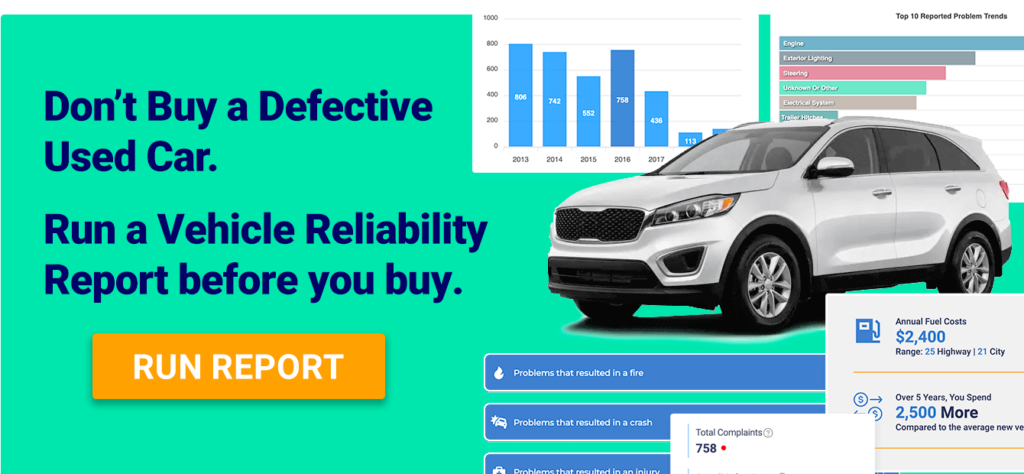

Managing Editor
Christopher is an automotive technical writer. When he’s not at the local autocross event, he can often be found working on one of his cars. Specializes in automotive class action law, industry trends, and automotive maintenance. Email me direct, or learn more about us

